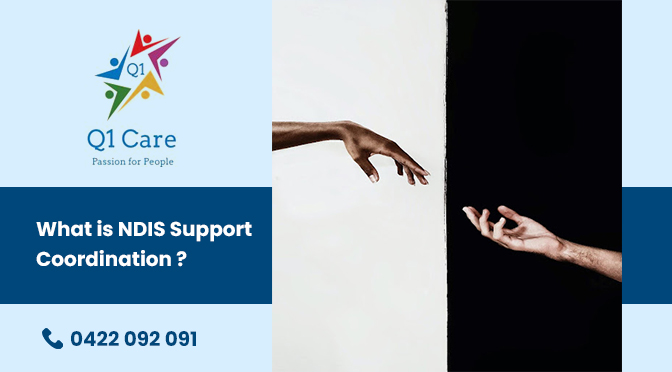It’s a capacity building support to implement all supports in a participant’s plan, including your informal, your mainstream, and your community and funded supports. And the funds for Support Coordination sit under the capacity building category in your plan. And the funds for Support Coordination sit under the capacity building category in your plan. And I just like to unpack that statement a bit more. So, in terms of capacity building, the NDIS is all about helping people to build their capacity so that they are more able to lead an ordinary life. So our Support Coordinators at Q1 Care and any other Support Coordination organization should be working with you as a participant to assist you to build your understanding of the scheme.

What Sources of support for disabled persons exist?
Friends and neighbors who provide you with emotional and practical supports throughout your life. This cannot and will not be funded by the NDIS. Obviously, mainstream support refers to supports that everyone has access to under different sectors like health, education, community transport, and housing. Community supports that refers to things again that everyone has access to within their community, such things as library, community hubs, the wider society would be another community support social groups and programs. And then finally there are your funded supports, and these are the supports that the NDIS funds including but not.

Who is qualified for a support coordination?
- A participant who has complex or high intensity needs. Somebody living with a cognitive impairment. Someone living with limited informal support. There may be none.
- Somebody living in a location where there are limited services.
- Or someone who has English as a second language.
- Someone who has limited access to technology like a smartphone. Tablet or computer.
- Somebody who is facing housing difficulties.
- somebody who was dealing with maybe the health sector, housing department is struggling with their employment or is in the justice system, people who are having difficulty understanding their plan, processing the information and retaining it, and those people that would have trouble finding and coordinating their own services.

Do Support Coordinators work alone?
No! They should be able to provide you with solutions so that things start to run seamlessly for you. They’re there to help you consider new goals, and they would do that with you, in consultation with you and with other people that are important to you. So if you’ve got family members that you would like included in that conversation, when you’re developing your goals for your following year, your support coordinator should be using not only with you, but with them. They’re also there to manage everyone’s expectations, both yours and the service providers. And that’s around the funding, that the funding is in line with your goals and your primary disability in terms of identifying solutions to problems, I just want to add to that it could be things like understanding your responsibilities under a service agreement. So for instance, if you needed to cancel a service to help you understand how much notice you need to give to the service providers. So, for instance, some service providers request that you give 24 hours’ notice if you want to cancel the service, otherwise they will be charging you for that service. And they would also be there to help you to change or end a service agreement if that was something that you wanted to do.
What do you expect from Q1 Care?
We always take direction from you about how you want your plan managed and you might choose to allocate some responsibility to us while you take on the responsibility of other things. Always the choice and control are yours, but together we believe we can help you to work towards your goals and improve your life for you. We’ve got insights into a wide range of providers and that helps us to match you with those that are going to meet your needs and your values.



